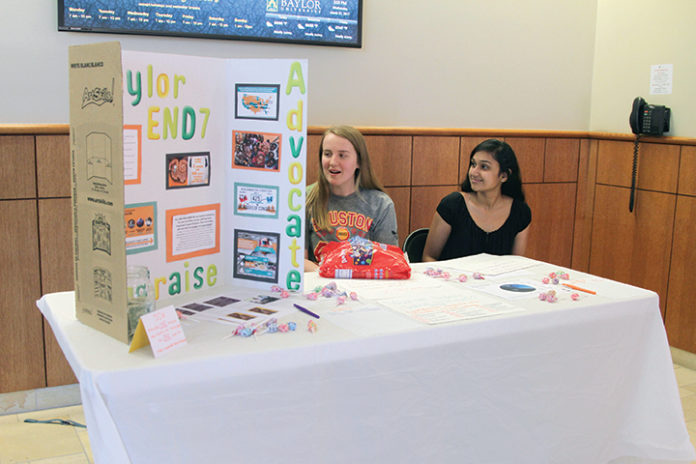
By Rachel Smith | Reporter
Members of Baylor’s END7 sought to raise awareness about neglected tropical diseases by setting up a table on Wednesday in the Baylor Sciences Building Atrium.
Neglected tropical diseases are a group of parasitic, viral and bacterial infectious diseases that cause more than 500,000 deaths per year, according to END7’s website. Seattle junior Megin Parayil, a member of Baylor’s chapter of END7, said the organization aims to end seven neglected tropical diseases by 2020.
“It’s really upsetting that people aren’t able to get [treatment],” Parayil said. “I just thought somebody should speak up for them.”
These diseases include elephantiasis, river blindness, snail fever, trachoma, roundworm, whipworm or hookworm. Medicine to treat these diseases costs 50 cents per person for a year, but there are many afflicted people that cannot afford treatment.
“Currently, the funds that we’re donating go overseas, but it’s a national organization, so they get to decide where the money goes,” Parayil said.
Houston sophomore Christian Yarbrough said the government is trying to reduce funding for neglected tropical diseases. According to END7’s website, neglected tropical diseases currently receive 1 percent of U.S. global health funding.
“Our number one goal is to hopefully get more people aware of what NTDs even are,” Yarbrough said. “Another goal is to get people calling their senators. One of the biggest ways people can help is to get the government helping.”
Yarbrough said a large part of END7 is education, and the organization wants people in the U.S. to know about these diseases.
“These are diseases that mostly affect low-income countries, but they also exist in the United States, particularly the most impoverished areas of the United States in the south,” Yarbrough said. “All these are treatable. A lot of it has to do with people just not knowing about it.”
Hallettsville senior Ariane Kubena visited the table on her way to class.
“Honestly, this is a thing I didn’t know about, and probably the majority of the population didn’t know about,” Kubena said.
Kubena said the most surprising things she learned at the table came from the trivia cards Yarbrough showed her. Along with trivia questions, END7 members provided flyers, a donation jar and candy.
“A lot of people have misconceptions about these diseases,” Yarbrough said. “I think the trivia cards were a good way to challenge the misconceptions people have and to get them to think more deeply about this.”
Students who are interested in participating in Baylor END7 can like its Facebook page or email Parayil at Megin_Parayil@baylor.edu.
“They can also go onto OrgSync and request to join our group, and we will invite them to things,” Parayil said.





